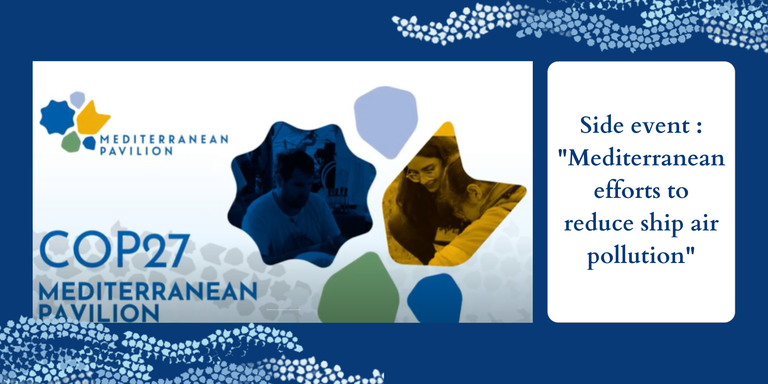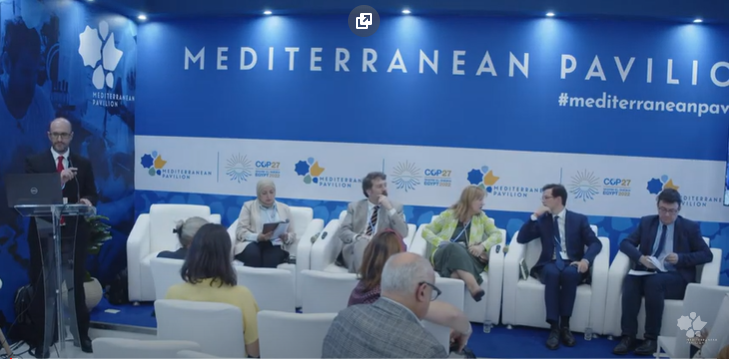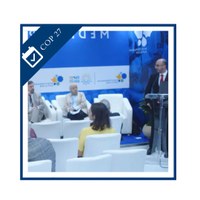SIDE EVENT | COP 27, EGYPT – Nov 29, 2022
COP 27 - Side event coordinated by REMPEC: Mediterranean efforts to reduce ship air pollution
As ship air emissions reductions is a topic highly discussed this year by the Contracting Parties to the Barcelona Convention, REMPEC has been coordinating a side event at the UNFCCC COP 27 on Mediterranean efforts to reduce ship air pollution. As part of the Mediterranean Pavilion, this event took place during the Energy Day in Sharm El Sheik in Egypt on November 15th 2022, (14:00-15:00, Malta time). Alongside REMPEC, the Event was presented with the Egyptian Environmental Affairs Agency, the French Ministry of Europe and Foreign Affairs, PAMEx Presidency, the MEDports Association, WestMED Assistance Mechanism, LIFE4MEDECA project, IMO and UNEP MAP.

This side event was an opportunity to present the measures put in place, in cooperation with regional stakeholders to implement concrete activities defined in consultation with beneficiary countries to support their ratification and effective implementation of MARPOL Annex VI, which regulate globally the prevention of air pollution from ships. As part of REMPEC activities to assist the Mediterranean coastal States to tackle pollution in the Mediterranean, the presentation aimed to raise awareness on the regional synergy established to reduce ship air pollution in the Mediterranean region, through technical cooperation and capacity-building activities, including financial support and resource mobilization activities.
This side event took place in the context of the recent decision taken in December 2021 by the Contracting Parties to the Barcelona Convention to address the Mediterranean efforts to reduce ship air pollution. In the matter of fact, two main decisions has been taken: the Decision IG.25/16 for the Mediterranean Strategy for the Prevention of, Preparedness, and Response to Marine Pollution from Ships (2022-2031) and the Decision IG.25/14 on the Designation of the Mediterranean Sea, as a whole, as an Emission Control Area for Sulphur Oxides (Med SOx ECA) pursuant to MARPOL Annex VI.
The ship emissions control is directly embodied in the Mediterranean Strategy (2022-2031) which sets seven Common Strategic Objectives (CSOs) followed by positive coordinated initiatives and among them the CSO 2 - Promote and support the development and implementation of innovative global solutions to mitigate and respond to climate change and CSO 3 - Reduce and monitor air emissions from ships to a level that is not harmful to the marine environment, or the health of the coastal population of the
Following this positive and coordinated initiatives to accelerate the process of reduction of air emissions, on the 29 November 2022 will take place at REMPEC the First Coordination Meeting on the Mediterranean Strategy for the Prevention of, Preparedness, and Response to Marine Pollution from Ships (2022-2031) in Malta. This event will extend the launch of the Strategy by reporting and assessing the progress made in the implementation of the Mediterranean Strategy (2022-2031) and defining priority actions and roles and responsibilities for the implementation of the proposed activities. It will define concrete synergies and will define a programme of work for 2024-2025 and even beyond.
In this scope, the initiatives implemented in the Mediterranean are the result of concerted regional efforts. Some major examples of initiatives have been presented during the side event, as the PAMEx initiatives, the MEDports Association, the WestMED Assistance Mechanism and the SDG4MED, LIFE4MEDECA project.
The plan of Action for a model Mediterranean Sea by 2030 (PAMEx) and its Local Investment Facility Greening Mediterranean Ports initiative presided by France was initiated in January 2021 during the One Planet summit for biodiversity in Paris which is a political document presenting the following axis: marine biodiversity, fisheries, pollution and marine transport. An example of concrete initiative is the action 14 : Promote green ports and marinas in the Mediterranean through electrification of port infrastructures, in particular quays and the provision of alternative fuels including low or zero carbon fuels.
The MEDports Association gathering 24 port authorities and 70 % of the total Mediterranean traffic covered more specifically the topic of the importance of practicing sustainability in ports with serval examples such as the ports of Lagoulette and Algesiras (green ports), Malta Freeports or Marseille (green hydrogen projects) with the importance of capacity building for the next generation of managers integrating the social value.
The WestMED presented the active support provided within the scope of the Mediterranean Strategy (2022-2031)through maritime clusters actions, green shipping technical groups, the community of practice in MSP and small ports diversification showing the potential of the synergies and the contribution to the development of a sustainable blue economy in the Western Mediterranean region. This can be embodied ina permanent observatory to watch technologies and implement two important pilot actions: the development of a network of port, the adaptation of commercial vessels, and change in the way green energy is consumed.
The SDG4MED in the presentation of LIFE4MEDECA project encompasses the importance of cooperation in the effort of reduction of air pollution, with capacity building led through knowledge assistance and technical, legal or financial support provided in the sight of the Mediterranean Strategy (2022-2031) and in close cooperation with REMPEC.

The Mediterranean region plays a central role in global efforts to reduce air pollution and Green House Gas (GHG) emissions from international shipping. This year World Maritime Day theme “New technologies for greener shipping”, show case the work of IMO to reduce the impact on environment by regulating a safer, more secured and efficient shipping for cleaner oceans, notably through MARPOL Annex VI on Air Pollution from ships. The global regulation is also encompassed through IMO 2020 sulphur regulations with 0.50% of global sulphur limit in bunker fuels which took effect in January 2020 and an estimated drop of 77% of total SOx emissions from international shipping. The coordinated collective effort led by the Barcelona Convention, paved the way to the acceleration of the process of decarbonization of international shipping with the discussions on the adoption of the Mediterranean SOx ECA that will take place mid-December 2022, with its entry into effect in 2025, should it be adopted. Reducing the emission is also possible through alternative sources of energy and setting the appropriate global regulatory environment enabling the uptake of low and zero-carbon marine fuels through a revised IMO strategy.
Several Action are thus necessitated to address local air pollutants and reduce GHG emissions from ships through technical cooperation and capacity building both at the national level and also at the port level on the provision of onshore power supply and incentive schemes for cleaner ships. Meeting the requirements of the global agreements to tackle climate change is a challenge that all the Mediterranean key players are willing to address together within the collaborative platform set-up within the Barcelona Convention which plays a pivotal role for a cleaner air and sea in the Mediterranean.
The event can be streamed online through the following link: https://youtu.be/iRscNcRumVU .
Find all the information about the event on the Med Pavilion website: : https://ufmsecretariat.org/mediterraneanpavilion/?event=mediterranean-efforts-to-reduce-ship-air-pollution


